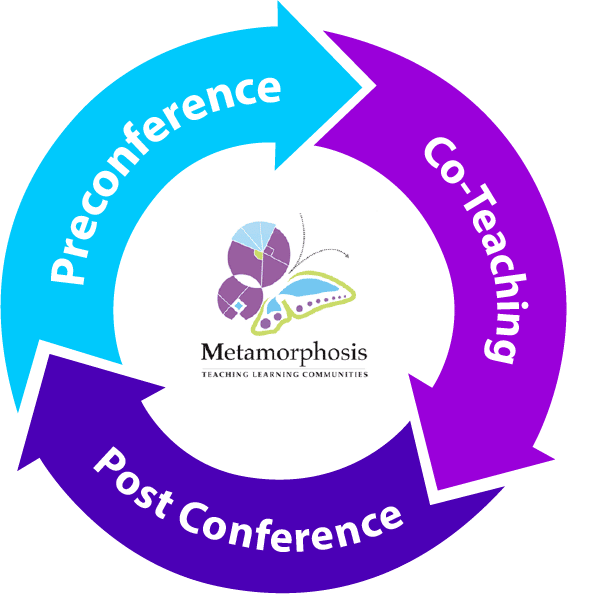Educators, Schools, districts & Organizations
Professional Development:
Three Pillars of Transformation
Traditional professional development often takes a “one-size fits all” approach. Metamorphosis customizes our work to meet our client’s needs. Offering content institutes, content coaching and cultivating professional learning communities as needed, we ensure that professional development actually results in increasing student achievement and a professional culture that improves teaching and learning for adults and students.
Our Research-based and proven method of Content Coaching addresses teachers’ and supervisors’ most pressing concerns. Partner with us to break through the implementation barrier and translate workshops and other one-off professional development experiences into effective classroom practice.
Our rigorous Mathematics Institutes deepen teacher content knowledge and engage teachers in examining how students actually come to understand and excel in mathematics. We offer a variety of workshops that vary in length, and content. Regardless of whether workshops are virtual or in person, we know you will be coming back for more!
Our Professional Learning Communities bring teachers together at their grade levels to collaborate on lesson design and implementation, examine student work and consider ways to differentiate their instruction to meet the challenges of addressing a wide range of student needs. Research is clear: professionals who learn from and with one another are more effective at improving student learning and test scores.
Our convenient, cost-effective, and timesaving online e-Offerings support coaches and teachers on their journey to mastering the art and science of teaching and/or coaching.
CONTENT COACHING
Metamorphosis Master Coaches work on-site in schools or on-line using the proven, research-based, Content Coaching method. Using this side-by-side approach, coaches plan, implement and reflect on a lesson with a teacher or small group of teachers.
What is Content Coaching?
Content Coaching is a proven, strategic, systemic approach to improving student learning. It is focused on the instructional core: planning, implementing, reflecting on, and refining lessons based on evidence of student learning or lack thereof.
Content Coaching centers coaching on applications of conceptual content knowledge that provide all students with access to the domain under study. Content Coaches know that if students are to learn important and relevant content well, teachers need to focus their lessons on the big ideas, structures, and/or essential questions relevant to the discipline. Teachers need to deeply understand those ideas and structures and learn to make them accessible to students.
Content Coaches have expertise in at least three areas:
Mathematics: The content they are helping others teach.
Teaching: Ways of effectively teaching that content.
Learning: How people (teachers and/or students) learn that content.
Underlying Hypotheses
Four hypotheses underlie Content Coaching:
The focus of education needs to be on learning to learn, create, innovate, problem solve, communicate, and discern.
In order for teachers to facilitate robust learning habits in their students, they need to practice these learning habits themselves.
To improve instruction we need to focus on the underpinning concepts in a domain as well as attend to the development of skill within that domain. Therefore, teachers need to have deep and flexible knowledge about the content they teach and about how people learn that content.
To ensure a consistent level of effective instruction across a school or district, it is necessary to think systemically and take actions that ensure that all the adults in the system are interacting in productive ways that increase the intelligence and knowledge base of both the individual and the collective.
Theories That Inform Content Coaching:
The incremental theory of intelligence, and the effort-based principles of learning derived from this theory.
Knowledge-based constructivism, which builds on the work of Jean Piaget and Lev Vygotsky.
Systems theory, which requires us to see the whole system as a living organism in which the interactions of the players are interdependent, rather than seeing the system as a machine with separate, independent parts.
That a Growth Mindset, as defined in the work of Carol Dweck, is essential for students and adults to learn effectively.
Three-Part Content Coaching Cycle:

The Preconference: Collaboratively planning a rich lesson that focuses on important content & student learning.
Co-Teaching the Lesson: Side-by-side teaching designed to support the implementation of pedagogy & content planned in the preconference.
The Post Conference: Debriefing the lesson to highlight what worked, discuss teacher learning, examine student work & determine next steps.
MATH INSTITUTES
We offer a variety of workshops that vary in length, and content. Regardless of whether workshops are virtual or in person, we know you will be coming back for more!
Math Workshops
Newsletter Form
Stay up to date on the latest information from our team!







